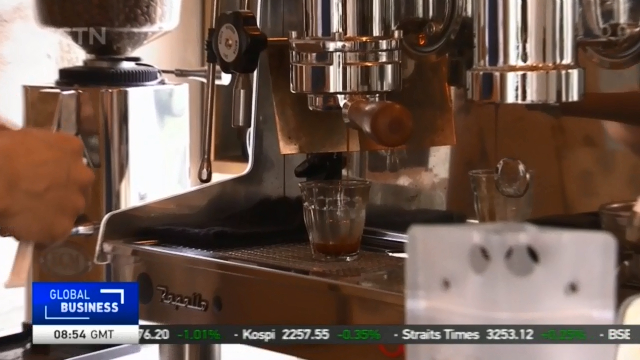
18:12, 05-Jul-2018
China's Burgeoning Coffee Market: Rise of boutique, specialist coffee stores amid fierce competition
Updated
17:46, 08-Jul-2018
03:45

China has traditionally been a tea-drinking nation. But coffee has made great inroads in recent times, attracting players from both home and abroad with different value propositions. This includes the rise of independent, boutique stores as Chinese consumers seek higher quality coffee. Wei Lynn Tang checks in on two smaller cafes and brings us this report.
China's coffee market is brewing – hotter, stronger, faster. While international coffee chains have made known their plans to grow aggressively here, it appears specialist stores are slowly but steadily marking their mainstay in the market resulting in what is known as the third wave of coffee culture.
MICHAEL HONGFU FOUNDER, FLATWHITE CAFE "China's coffee market is at the crossroads between instant and commercial coffee. Though it's still early stages in China when it comes to specialty coffee, the future of this market lies in quality coffee--which the American market has transitioned into. And while scale is crucial, the biggest challenge for us when it comes to expanding and in leveraging e-commerce to deliver coffee, is how do we ensure good quality across the board."
WEI LYNN TANG BEIJING "If you stepped into a cafe in China in the past, you would have found mostly expats. In recent times however, while you will still find loyal tea-drinkers among the young Chinese, more and more are turning to coffee as their go-to beverage. And the latte, which is what I am having right now, is said to be the favourite of many."
According to Euromonitor, Starbucks dominated China's coffee market with a 58.6 percent share in 2016. Costa Coffee had just 3.8 percent. It's a four-billion US dollar industry, and new players want their own slice of the growing pie.
BRUNO LANNES PARTNER, BAIN & COMPANY "So it's fragmented even though everybody talks about the same names so I think there's room for either consolidation of that market and could we see 5 or 6 players emerging with 5-thousand, 10-thousand stores or more independent, more innovative models like we have seen in other markets."
Independent stores have been on the rise driven by China's increasingly-wealthy middle class that demands better choices.
This undergraduate student tells me her coffee consumption has increased in the past two years. She's now up to 3 to 4 cups a week. And it's not just because she finds it necessary.
UNDERGRADUATE STUDENT "When I find out that I have many other options through social media platforms like WeChat, I would go to smaller places because it has better atmosphere and also the taste of coffee is better because it is made with special craft."
This is not deterring big players like Starbucks to expand, as it aims to double down on its number of stores to six thousand, over the next five years.
And there is the emergence of a new retail model, where you can get your coffee delivered to your doorstep, or for later pick-up, all through an app.
It's an unusual way to get one's cup of Joe, and it's uncertain it can succeed. But the lure of the market's size is convincing entrepreneurs to take more risks.
MICHAEL HONGFU FOUNDER, FLATWHITE CAFE "China's coffee market has huge potential for growth, where it's not enough for just one business or big player to compete in. The average coffee drinker in America drinks 45 times as much as the average Chinese consumer."
Globally, coffee consumption grew by just 2 percent. In China, the growth rate is in the teens, and that's enticing existing players to expand, and attracting new ones to come in. It's an industry that still relatively in its infancy. Naturally, businesses are eager to have a stake in how it matures. WLT, CGTN, Beijing.

SITEMAP
Copyright © 2018 CGTN. Beijing ICP prepared NO.16065310-3
Copyright © 2018 CGTN. Beijing ICP prepared NO.16065310-3